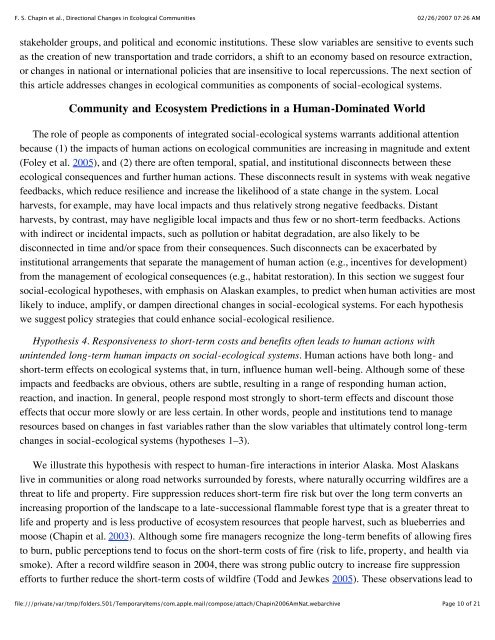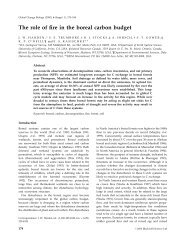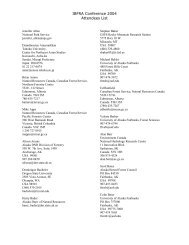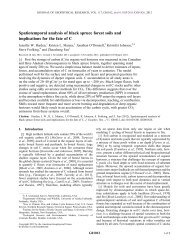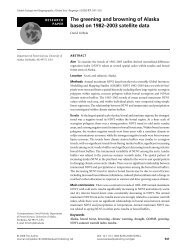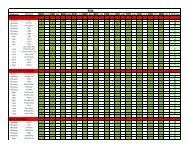Chapin, F.S., III, M.D. Robards, H.P. Huntington, J.F. Johnstone, S.F. ...
Chapin, F.S., III, M.D. Robards, H.P. Huntington, J.F. Johnstone, S.F. ...
Chapin, F.S., III, M.D. Robards, H.P. Huntington, J.F. Johnstone, S.F. ...
Create successful ePaper yourself
Turn your PDF publications into a flip-book with our unique Google optimized e-Paper software.
F. S. <strong>Chapin</strong> et al., Directional Changes in Ecological Communities<br />
02/26/2007 07:26 AM<br />
stakeholder groups, and political and economic institutions. These slow variables are sensitive to events such<br />
as the creation of new transportation and trade corridors, a shift to an economy based on resource extraction,<br />
or changes in national or international policies that are insensitive to local repercussions. The next section of<br />
this article addresses changes in ecological communities as components of social-ecological systems.<br />
Community and Ecosystem Predictions in a Human-Dominated World<br />
The role of people as components of integrated social-ecological systems warrants additional attention<br />
because (1) the impacts of human actions on ecological communities are increasing in magnitude and extent<br />
(Foley et al. 2005), and (2) there are often temporal, spatial, and institutional disconnects between these<br />
ecological consequences and further human actions. These disconnects result in systems with weak negative<br />
feedbacks, which reduce resilience and increase the likelihood of a state change in the system. Local<br />
harvests, for example, may have local impacts and thus relatively strong negative feedbacks. Distant<br />
harvests, by contrast, may have negligible local impacts and thus few or no short-term feedbacks. Actions<br />
with indirect or incidental impacts, such as pollution or habitat degradation, are also likely to be<br />
disconnected in time and/or space from their consequences. Such disconnects can be exacerbated by<br />
institutional arrangements that separate the management of human action (e.g., incentives for development)<br />
from the management of ecological consequences (e.g., habitat restoration). In this section we suggest four<br />
social-ecological hypotheses, with emphasis on Alaskan examples, to predict when human activities are most<br />
likely to induce, amplify, or dampen directional changes in social-ecological systems. For each hypothesis<br />
we suggest policy strategies that could enhance social-ecological resilience.<br />
Hypothesis 4. Responsiveness to short-term costs and benefits often leads to human actions with<br />
unintended long-term human impacts on social-ecological systems. Human actions have both long- and<br />
short-term effects on ecological systems that, in turn, influence human well-being. Although some of these<br />
impacts and feedbacks are obvious, others are subtle, resulting in a range of responding human action,<br />
reaction, and inaction. In general, people respond most strongly to short-term effects and discount those<br />
effects that occur more slowly or are less certain. In other words, people and institutions tend to manage<br />
resources based on changes in fast variables rather than the slow variables that ultimately control long-term<br />
changes in social-ecological systems (hypotheses 1–3).<br />
We illustrate this hypothesis with respect to human-fire interactions in interior Alaska. Most Alaskans<br />
live in communities or along road networks surrounded by forests, where naturally occurring wildfires are a<br />
threat to life and property. Fire suppression reduces short-term fire risk but over the long term converts an<br />
increasing proportion of the landscape to a late-successional flammable forest type that is a greater threat to<br />
life and property and is less productive of ecosystem resources that people harvest, such as blueberries and<br />
moose (<strong>Chapin</strong> et al. 2003). Although some fire managers recognize the long-term benefits of allowing fires<br />
to burn, public perceptions tend to focus on the short-term costs of fire (risk to life, property, and health via<br />
smoke). After a record wildfire season in 2004, there was strong public outcry to increase fire suppression<br />
efforts to further reduce the short-term costs of wildfire (Todd and Jewkes 2005). These observations lead to<br />
file:///private/var/tmp/folders.501/TemporaryItems/com.apple.mail/compose/attach/<strong>Chapin</strong>2006AmNat.webarchive<br />
Page 10 of 21


